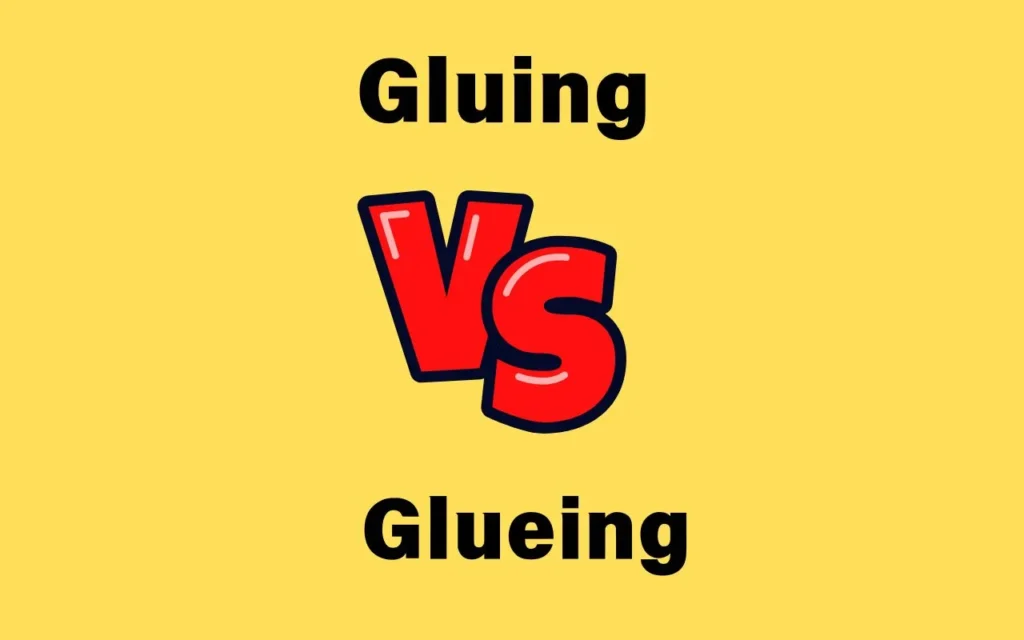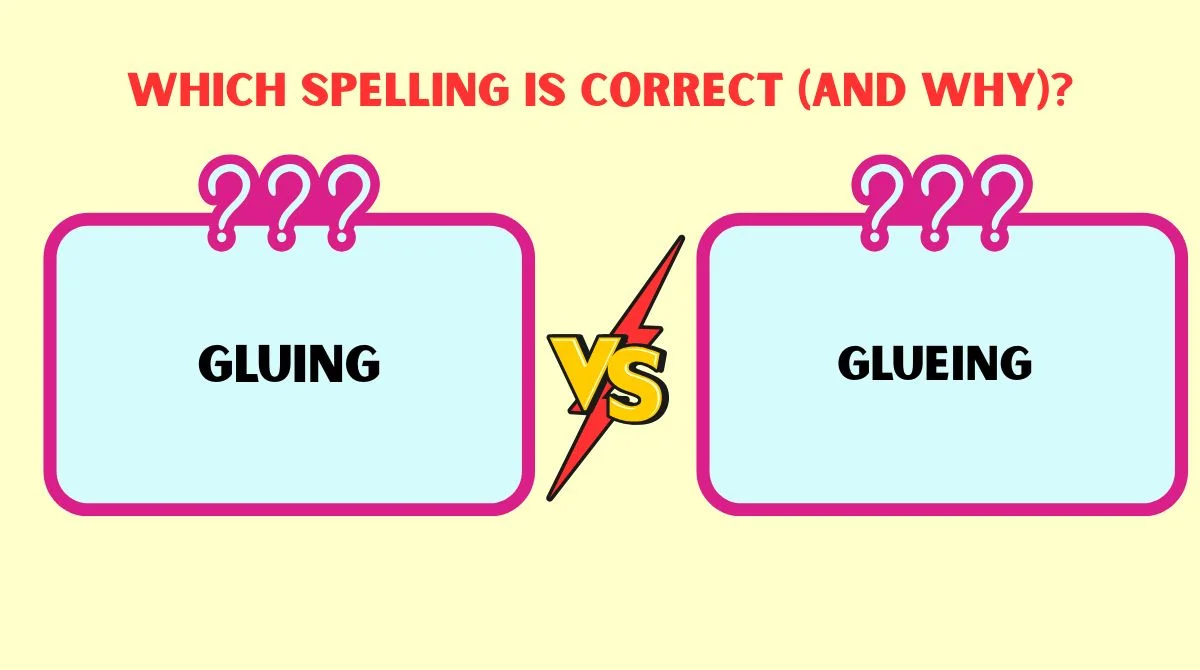Last updated on September 26th, 2025 at 03:26 pm
English spelling can feel like a maze. Some words look like they should keep an extra letter, others drop it, and learners often wonder if both versions are valid.
One of the most common examples is gluing vs glueing. Which spelling should you use? Why does the confusion even exist? And most importantly, how do you avoid making this mistake again?
Let’s break it down in detail, with real-world examples, history, grammar rules, and a handy reference table that clears up the debate once and for all.
What Do “Gluing” and “Glueing” Mean?

At their core, both gluing and glueing try to describe the same action: attaching or fastening something with glue.
- Gluing: This is the standard and correct spelling accepted in modern English.
- Glueing: While it looks logical—since the base word is “glue”—this version is outdated and not recognized by dictionaries today.
Think of it this way: if you’re working on a craft project, fixing a broken vase, or sticking photos into an album, the word you want is always gluing, never glueing.
Quick Examples of “Gluing” in Sentences
Seeing the word in context makes it easier to remember. Here are a few natural examples:
- She spent the afternoon gluing paper cutouts onto a poster board.
- The carpenter is gluing the wooden panels together before nailing them.
- Students were busy gluing their science models for the exhibition.
- He regretted gluing the broken handle instead of replacing it.
Notice how “gluing” fits smoothly in each sentence. If you were to replace it with “glueing,” the word would look awkward and distract the reader.
The Origin of the Gluing vs Glueing Confusion
The confusion comes from the silent final “e” rule in English spelling. When adding -ing to verbs that end with “e,” the final letter is often dropped.
For example:
- bake → baking
- ride → riding
- dance → dancing
Because “glue” ends in an “e,” most learners assume “glueing” is correct. However, English spelling rules introduce exceptions when dropping the “e” would change the way the word is pronounced.
Take a look:
- dye → dyeing (to avoid confusion with dying = death)
- singe → singeing (to avoid confusion with singing = vocalizing)
For “glue,” no confusion exists when dropping the “e.” So the correct form is gluing, not glueing.
Historical Snapshots: Where “Glueing” Appeared
Although wrong today, “glueing” wasn’t always absent. Older texts sometimes used it before spelling conventions were standardized.
A quick look at Google Books Ngram Viewer (which tracks word usage across millions of publications) shows that:
- “Glueing” appeared sporadically in the 18th and 19th centuries.
- Its usage declined sharply in the 20th century as dictionaries and style guides established gluing as the standard.
- Today, “glueing” barely registers in print compared to “gluing.”
This historical snapshot explains why you might stumble upon “glueing” in old manuals or scanned books—but it doesn’t make it correct anymore.
American English vs British English: Is “Glueing” Ever Correct?
Sometimes spelling differences are explained by American English vs British English. For instance:
- color (US) vs colour (UK)
- organize (US) vs organise (UK)
But in this case, both American and British English agree: gluing is correct, while glueing is obsolete.
Even Oxford English Dictionary (UK) and Merriam-Webster (US) only recognize gluing. That makes this one of the rare instances where there’s no transatlantic spelling fight—everyone is on the same page.
What Major Style Guides Say
Trusted references confirm the standard spelling:
- Oxford English Dictionary: Only lists “gluing.”
- Merriam-Webster Dictionary: Defines “gluing” as the sole present participle of “glue.”
- Cambridge Dictionary: Shows examples with “gluing.”
- Chicago Manual of Style: Recommends dropping the final “e” when forming “-ing” unless pronunciation is affected.
- Associated Press (AP) Stylebook: Follows the same principle, recognizing only “gluing.”
In short: if you want your writing to be taken seriously, stick with gluing.
Grammar Rules Simplified: Dropping the “E” Before Adding “-ing”
The rule is simple but powerful:
- If a verb ends in a silent “e,” drop it before adding “-ing.”
Examples:
- bake → baking
- ride → riding
- hope → hoping
Exceptions: When You Keep the “E”
- If removing the “e” changes pronunciation, you keep it.
- dye → dyeing (to separate from dying)
- singe → singeing (to separate from singing)
Since “glue” doesn’t cause confusion when the “e” is dropped, it becomes gluing.
Why This Rule Exists
The English language values phonetic clarity. Dropping or keeping the “e” helps avoid ambiguity and ensures words remain easy to read and pronounce.
For “gluing,” dropping the “e”:
- Prevents awkward vowel clusters.
- Keeps pronunciation smooth.
- Matches broader spelling patterns in English.
Without this rule, readers might stumble when encountering verbs in different forms.
Why “Glueing” Is Considered a Spelling Mistake Today
There are several reasons why “glueing” doesn’t hold up:
- ❌ Not recognized by major dictionaries.
- ❌ Doesn’t follow grammar rules consistently.
- ❌ Looks unprofessional in formal writing.
- ❌ Rare in modern usage, which makes it confusing to readers.
Using “glueing” in a professional document, academic paper, or published book signals a spelling mistake, not an alternative spelling.
Real-World Case Study
Let’s look at real-world data:
A search on Google Books Ngram Viewer shows:
- Gluing skyrockets in frequency after 1900.
- Glueing peaks around 1850 but then falls almost completely out of use.
In modern published works (2010 onward):
- Gluing appears thousands of times across scientific research, craft guides, and textbooks.
- Glueing appears so rarely it’s often flagged as a typo.
Quote from Merriam-Webster’s online dictionary:
“The present participle of glue is gluing. The form glueing is not in common use.”
This makes it clear: in real-world usage, only one spelling has survived.
Tips to Remember the Correct Spelling
Want to avoid the mistake forever? Here are some tricks:
- Mnemonic device: “Drop the ‘e’ to keep it neat.”
- Think of similar verbs:
- cue → cuing
- argue → arguing
- glue → gluing
- Flashcard reminder: Write “gluing” three times and cross out “glueing.”
- Practice sentences: Incorporate “gluing” into daily writing exercises.
Consistency builds memory. Once you’ve written it correctly a few times, it’ll stick—just like glue.
Related Words With Tricky “-ing” Forms
English has several verbs that don’t follow the straightforward “drop the e” rule. Here are some that often confuse learners:
- dye → dyeing
- lie → lying
- tie → tying
- shoe → shoeing
- singe → singeing
Notice how exceptions usually occur to preserve meaning or clarify pronunciation. That’s why “gluing” stays simple—there’s no confusion to resolve.
Quick Reference Table: Gluing vs Glueing
Here’s a handy table for quick checks:
| Word Form | Correct? | Region/Usage | Notes |
|---|---|---|---|
| Gluing | ✅ Yes | US/UK/Global | Recognized in all dictionaries |
| Glueing | ❌ No | Rare, outdated | Considered a spelling mistake |
FAQs
Is it gluing or glueing?
The correct spelling is gluing. “Glueing” is outdated and not accepted in modern English.
Why is glueing wrong?
Because English grammar rules drop the final “e” before adding “-ing” unless it affects pronunciation. That’s why “gluing” is correct.
Do Americans and Brits spell it differently?
No. Both American and British English use gluing as the correct spelling.
What do style guides say about gluing vs glueing?
Major style guides like Oxford, Merriam-Webster, and Chicago Manual of Style only recognize gluing.
Are there exceptions to dropping the “e” rule?
Yes. Words like dye → dyeing or singe → singeing keep the “e” to avoid confusion in meaning or sound.
How can I remember the correct spelling of gluing?
Use this tip: “Drop the e to keep it neat.” Just like argue → arguing, glue becomes gluing.
Conclusion
The verdict is clear: gluing is the only correct spelling in modern English. While “glueing” appeared in older texts, it’s now obsolete and considered an error.
Whenever you’re tempted to write “glueing,” remember the rule: drop the e before adding -ing unless it changes pronunciation. In this case, it doesn’t, so the choice is simple—stick with gluing.
Like glue itself, this rule holds everything together neatly.
